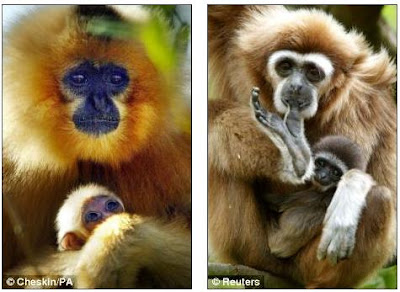 Give us a song: Gibbons sing to each other in regional accents - and the divide between the northerners and southerners is the most pronounced, research shows
Give us a song: Gibbons sing to each other in regional accents - and the divide between the northerners and southerners is the most pronounced, research showsGibbons have regional accents just like humans - and the divide between the northerners and southerners is the most pronounced, research shows.
Gibbons, which along with the great apes are the closest relatives to humans, sing to communicate with each other, and use song to define territory and woo mates.
Couples also sing in duets to strengthen their bond, and their song is adpated to carry through the forests.
Scientists analysed the songs of the primates in Asian rainforest in China, Laod, Cambodia and Vietnam, and found that the songs are distinct not only to each species of gibbon but also to the area it comes from.
A team from the German Primate Center looked at more than 400 samples of crested gibbon song including 92 duets and analysed them using 53 acoustic parameters.
Writing in journal BMC Evolutionary Biology, they say the song shows not only the regional differences in 'accents' but also could give clues to their migrationary past.
The gibbons from Cambodia, Laos and Vietnam had the most closely related DNA, and although four distinct song patterns were identified, they were recognisable as being from the same region.
But two species from northern Vietnam and China had different 'accents' and were distinct from their southern relatives.
The further north the accents were, the more removed they were from the southern accents. This would suggest that ancestorally, gibbons migrated from north to south, say the team.
 Every species of gibbon sounds different, but researchers identified a range of different dialects which give clues to the animals' migratory pasts
Every species of gibbon sounds different, but researchers identified a range of different dialects which give clues to the animals' migratory pastsThey write: 'We found the largest differences in the song structure between the most northern and most southern species with successive gradation between them.
'The results show that the structure of crested gibbon songs is not only a reliable tool to verify relatedness but also to unravel geographic origins.'
Reseacher Van Ngoc Thinh said: 'Each gibbon has its own variable song but, much like people, there is a regional similarity between gibbons within the same location.'
source: dailymail














